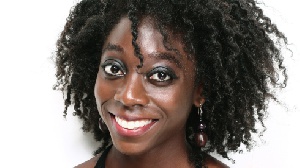The Durban FilmMart winners were announced Monday. Young Ghanaian femme helmer Akosua Adoma Owusu’s project won ARTE France’s ARTE International Award, which is worth 6,000 euros ($7,918) for her project, “Black Sunshine.” She hopes to begin shooting her feature in the first quarter of 2014 for a 2015 release. Variety caught up with her ahead of the announcement.
We ran a story at the beginning of the festival about the number of female directors involved here. How do you feel about the opportunities afforded to female directors like yourself?
That’s interesting, because the history of African story-telling has always been deeply-rooted with females being the story-tellers in our culture, and I find it really interesting how now there’s this new wave of African female filmmakers who are now telling stories. And not just specifically in Ghanian culture, but all over, including Kenya and South Africa in general.
How do you feel about making your first feature?
I have a background in making experimental film videos in the fine arts world. As of now, I can’t say I have had too much of a problem or difficulty in making films. There are also a lot of great initiatives out there assisting African story-tellers.
What’s the most exciting thing about being a young filmmaker in Africa?
There’s so many stories that we can be telling. We’re at a place where we have all these resources available to us. There’s a lot of great African talent that is ready to tell our stories, instead of having them filtered through other people. It’s time for us to take over the reins and promote our cultures.
What is the film industry in Ghana like, and where does it stand right now?
The film industry in Ghana is very similar to the Nollywood film model (Nigeria): We’re both Anglophone African countries, and more specifically Ghanaian films are very local. The films end up being shown to Africans and the diaspora in the U.K. and U.S., but in terms of traveling to international films festivals, it’s very rare that a Gollywood (Ghanaian) film reaches international markets. But there are a lot of new exciting things happening within the Ghanaian film industry. For example, the films made in Kumasi in the village are very local — they are comedic — and then you have the films from the city, which are very English and they speak to the middle-class. So I feel there is a divide, but I do feel like there are other stories that can be explored. It seems there are a lot of love stories and stories to entertain. There’s still room for growth.
Is there a cinema-going public?
No. There is one active cinema in Ghana — Silver Bird (in Accra Mall). They show mostly foreign films like big blockbusters. Most Ghanaian films go straight to DVD. Ghanaians mostly watch TV. It’s not common for people to go out to theaters and pay to watch films.
So do people know of you and your work at home?
I’ve just started being well-known in Ghana. I recently won the Africa Movie Academy Award (for Best Short Film), a short film call “Kwaku Ananse.” Before that I felt like a Ghanaian abroad for international audiences, and that win kind of brought me back home and I feel it’s easier to navigate the Ghanaian industry because of that recognition.
How did “Black Sunshine” come about?
It came about as a thesis film at film school, but I realized I didn’t have enough time to produce a feature-length film, so I made a short film called “My White Baby,” that was a documentary with similar themes as “Black Sunshine.” I was also able to workshop this project at Produire au Sud. Then from there I went to different film labs, and now I’m here to pitch it at Durban FilmMart.
Albinism is a big issue in some parts of the continent, where some albinos are even killed for their body parts. Did your research and script development entail interviewing the public?
My film is not like a documentary, (designed to make people) aware of the killings of albinos. My film is a fiction that talks about these issues in a creative way without hitting people over the head about it. I think if we talk about these issues, I could risk creating a negative portrayal. I don’t want to perpetuate these negative pictures of Africa as seen in other films.
What’s it about?
It’s about a black mother who wants to escape her African reality and an albino girl who just wants to fit into her community. It’s about a mother-daughter conflict, which is also visible. I think we got a lot of great feedback (at FilmMart pitching forums). We’re just really happy to be here.
Entertainment of Tuesday, 23 July 2013
Source: Andile Ndlovu-Variety

















